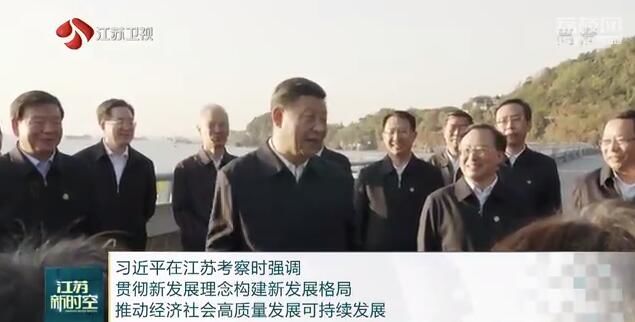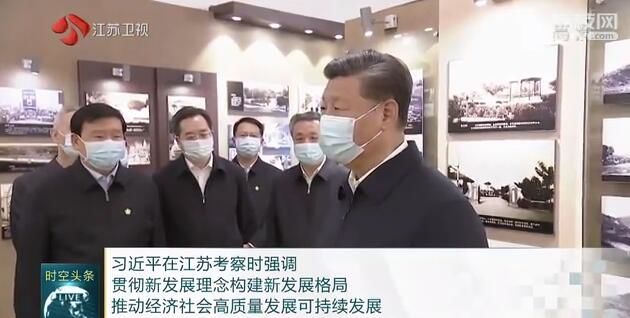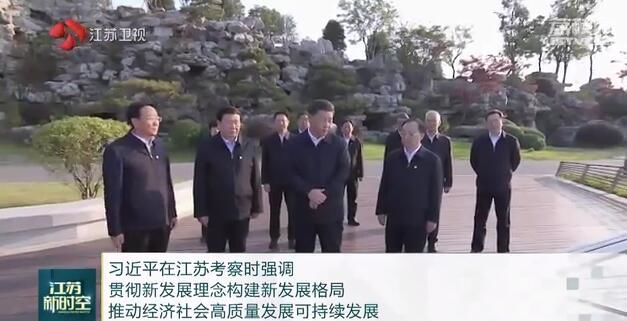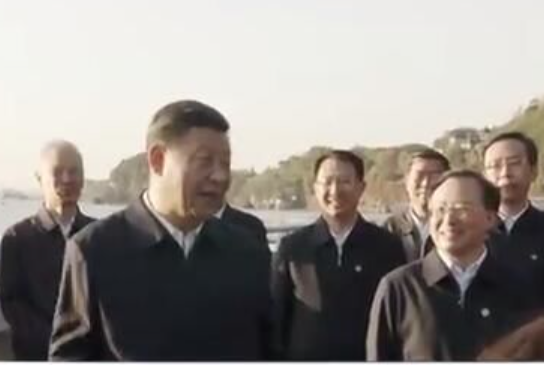Xi Jinping, general secretary of the Communist Party of China Central Committee, went on an inspection tour in east China’s Jiangsu province on Thursday and Friday.
The inspection tour came after Xi attended a grand gathering to celebrate the 30th anniversary of the development and opening-up of Shanghai's Pudong.
On Thursday afternoon, Xi went to a riverside district in the city of Nantong where he inspected local efforts in improving the overall environment along the shoreline of the Yangtze River, as well as the enforcement of fishing ban policies.

Xi said he visited here specially to learn about local efforts in overhauling the environment as he came to inspect the Yangtze Economic Belt and the integrated development of the Yangtze River Delta.
"The dirty and messy places in the past have been turned into green belts in parks now," Xi said, noting that a happy life is achieved through the hard work of all.
Xi urged efforts to blaze a new trail of green development that gives priority to ecology, so as to provide powerful support for the high-quality and sustainable development of the Yangtze Economic Belt.
After learning that the dirty and messy places in the past have been turned into attractive parks, Xi said a happy life has been achieved through the hard work of all.
More prominence should be given to protect urban environment and ensure better quality of economic development and people's lives, Xi said.

Xi later visited the Nantong Museum, where he watched exhibits introducing Zhang Jian, a Chinese industrialist and educator in the late 19th century and early 20th century. The museum, founded by Zhang in 1905, is the first public museum founded by Chinese.
Xi was briefed on Zhang's deeds in developing China's domestic industries, education and public welfare undertakings.
Zhang Jian as a model of all Chinese private entrepreneurs, Xi said the museum and Zhang's former residence should be turned into a base for patriotic education, which can enhance the sense of social responsibility of private entrepreneurs and the country's youth and their confidence in the path, theory, system, and culture of socialism with Chinese characteristics.

On Friday, The CPC General Secretary inspected the city of Yangzhou during his tour in Jiangsu.
While visiting an ecological and cultural park in Sanwan area in Yangzhou, Xi learned about environmental remediation and ecological restoration along the Grand Canal and the development of a demonstration zone of modernized shipping.
Building ecological civilization directly concerns the happiness of the people, bears significance to the growth of young people, and meets the consensus and aspiration of the broad masses of the people, he said.

At a site of the Jiangdu Key Water Conservancy Project, Xi learned about the planning and construction of the eastern route of the country's South-to-North Water Diversion Project, and the operation of the water conservancy project.
Xi stressed coordination of implementation of the country's South-to-North Water Diversion Project and water-saving efforts in northern China.
He also stressed guiding the development of cities and industries based on water capacities and making more efforts in water conservation.
During his inspection tour in Jiangsu, Xi Jinping stressed efforts to apply the new development philosophy and foster a new development pattern to advance high-quality and sustainable economic and social development.
Xi urged Jiangsu to focus its efforts on striving to be a model of reform and innovation as well as advancing high-quality development, take the lead in promoting the country's establishment of a new development paradigm, and become a frontrunner in realizing socialist modernization.
When chairing a symposium in Nanjing on comprehensively advancing the development of the Yangtze River Economic Belt, Xi Jinping stressed efforts to implement the spirit of the fifth plenary session of the 19th Central Committee of the Communist Party of China and promote the high-quality development of the Yangtze River Economic Belt.
He called for efforts to write a new chapter in prioritizing ecological conservation and boosting green development, create a new model for regional coordinated development, build a new height for high-level opening-up, foster new advantages in innovation-led development, and draw a new painting featuring harmony among the landscape, the people and the city.
Such efforts are aimed at turning the Yangtze River Economic Belt into the country's main battlefield for green development, the main artery for a smooth "dual circulation" of domestic and international markets, and the main force spearheading high-quality economic development, he said.






